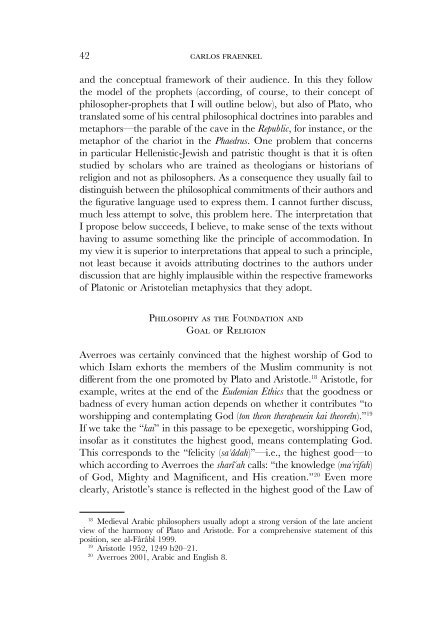Download PDF - Carlos F. Fraenkel
Download PDF - Carlos F. Fraenkel
Download PDF - Carlos F. Fraenkel
You also want an ePaper? Increase the reach of your titles
YUMPU automatically turns print PDFs into web optimized ePapers that Google loves.
42 carlos fraenkeland the conceptual framework of their audience. In this they followthe model of the prophets (according, of course, to their concept ofphilosopher-prophets that I will outline below), but also of Plato, whotranslated some of his central philosophical doctrines into parables andmetaphors—the parable of the cave in the Republic, for instance, or themetaphor of the chariot in the Phaedrus. One problem that concernsin particular Hellenistic-Jewish and patristic thought is that it is oftenstudied by scholars who are trained as theologians or historians ofreligion and not as philosophers. As a consequence they usually fail todistinguish between the philosophical commitments of their authors andthe figurative language used to express them. I cannot further discuss,much less attempt to solve, this problem here. The interpretation thatI propose below succeeds, I believe, to make sense of the texts withouthaving to assume something like the principle of accommodation. Inmy view it is superior to interpretations that appeal to such a principle,not least because it avoids attributing doctrines to the authors underdiscussion that are highly implausible within the respective frameworksof Platonic or Aristotelian metaphysics that they adopt.Philosophy as the Foundation andGoal of ReligionAverroes was certainly convinced that the highest worship of God towhich Islam exhorts the members of the Muslim community is notdifferent from the one promoted by Plato and Aristotle. 18 Aristotle, forexample, writes at the end of the Eudemian Ethics that the goodness orbadness of every human action depends on whether it contributes “toworshipping and contemplating God (ton theon therapeuein kai theoreîn).” 19If we take the “kai” in this passage to be epexegetic, worshipping God,insofar as it constitutes the highest good, means contemplating God.This corresponds to the “felicity (saâdah)”—i.e., the highest good—towhich according to Averroes the sharîah calls: “the knowledge (marifah)of God, Mighty and Magnifi cent, and His creation.” 20 Even moreclearly, Aristotle’s stance is reflected in the highest good of the Law of18Medieval Arabic philosophers usually adopt a strong version of the late ancientview of the harmony of Plato and Aristotle. For a comprehensive statement of thisposition, see al-Fârâbî 1999.19Aristotle 1952, 1249 b20–21.20Averroes 2001, Arabic and English 8.



